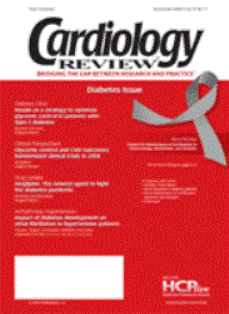Publication
Article
Cardiology Review® Online
ABC’s community health advocates: Leading the charge to decrease and prevent cardiovascular disease in diabetic patients
Diabetes is a coronary heart disease equivalent and a major risk factor for cardiovascular disease. Approximately 1 in 8 African American adults have diabetes and the incidence continues to grow because of increasingly sedentary lifestyles and the growing number of overweight and obese individuals in the United States. While diabetes is a serious health concern in all patients, it is especially disconcerting in African Americans and other minorities, who are more likely to die from the disease than similarly aged white patients.
To fulfill its commitment to decreasing disparities in diabetes and cardiovascular diseases in African Americans, the ABC uses community-based education as its distinctive hallmark. While direct interaction between the provider and patient is essential to controlling cardiovascular risk factors and improving clinical outcomes, the ABC seeks to move beyond the walls of physicians’ offices, hospitals, and other clinical settings, and into the communities where patients live and work. To help achieve this goal, the ABC conducted its second annual Community Health Advocate Training (CHAT) program at the ABC headquarters in Atlanta, Georgia, between September 18 and 20. The program was directed by Icilma V. Fergus, MD, Chief of Cardiology, Harlem Hospital Center, New York, and 144 health advocates from 12 cities attended. Workshops were conducted to increase awareness of cardiovascular diseases and diabetes, and to examine preventive and management measures. Participants shared their expertise, received evidence-based information, and learned how to implement new and interesting strategies to prevent and combat cardiovascular diseases in their home communities.
The educational platform for the CHAT program used culturally appropriate health information, which was based on a curriculum of materials from the National Heart, Lung, and Blood Institute (NHLBI). The training manual was supplemented with additional materials on evidence-based approaches to health promotion. Information provided described how to recognize risk factors for diabetes, including overweight status and obesity, physical inactivity, positive family history, and ethnicity (African American, Latino, American Indian, Asian, or Pacific Islander). Other risk factors for diabetes were also highlighted, such as a history of gestational diabetes and hypertension. Employing handouts and picture cards, the community health advocates were instructed on how to identify symptoms of diabetes, recognize hypoglycemia, and interpret blood glucose levels to assist their clients in recognizing the presence of diabetes versus normal or prediabetic blood glucose levels.
Because diet and physical activity are important measures for disease prevention and management, a significant portion of the curriculum included instructions on reading food labels (especially on understanding refined carbohydrates), promoting healthy food choices, and recognizing the importance of physical activity in promoting healthy living in diabetic patients. In addition to learning specific aspects of diabetes and other cardiovascular risk factors, participants were instructed on planning and organizing health advocacy.
The goal of the CHAT program is to train individuals to become community health advocates who can readily identify and evaluate health care issues in their communities, build partnerships and coalitions, network on a grassroots level, and potentially influence decision-makers to affect the legislative process. To facilitate this, community health advocates were trained on how bills become laws and the responsibility of state and federal governmental authorities to protect the health of their citizens. A final component of the program was to isolate multiple needs and objectives and to assess the development of community action plans, with specific goals and timelines for the realization and implementation of community health initiatives. Ultimately, the goal of CHAT is to ensure adequate funding for health promotions and therapeutic interventions at appropriate levels.
The collaboration of community health advocates with the ABC and the NHLBI was assisted by an unrestricted educational grant from AstraZeneca. For more information on the CHAT program, contact the ABC at (800) 753-9222.






